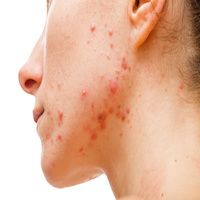News
Article
Omega-3 Fatty Acid Deficiency Could Be Driver of Acne Severity, Study Finds
Author(s):
A study found omega-3 supplements and a Mediterranean diet improved acne severity and quality of life in patients without prescription meds.
Credit: Fotolia

A new study suggests addressing omega-3 fatty acid deficits could play a key role in addressing acne severity.
A single-site, interventional study, results indicate adherence to a Mediterranean diet and omega-3 fatty acid supplementation was associated with quality of life benefits and improvements in inflammatory and noninflammatory lesions among patients with mild to moderate acne without the use of prescription acne medications.1
“Lifestyle interventions, including dietary recommendations, should not be considered in opposition to prescription medications, but rather as a valuable adjunct to any modern acne treatment plan,” said corresponding author Anne Guertler, MD, of the Ludwig Maximilian University of Munich, in Germany.2 “Future studies should build on the foundation laid by our current findings in a randomized, placebo-controlled design to improve dietary recommendations for acne patients.”
To better understand the effects of omega-3 fatty acids in acne, Guertler and a team of investigators launched the current study with the intent of evaluating the effects of raising EPA/DHA levels into a target range using dietary recommendations and oral supplementation of algae-derived EPA/DHA. The primary outcome of interest for the study was to measure the HS-omega-3 index and the achievement of mean levels to the target range through dietary recommendations including oral supplementation with EPA/DHA over the course of 16 weeks. For the purpose of analysis, a mean HS-omega-3 index between 8% and 11% at 16 weeks was considered a successful intervention.1
Patients had blood EPA/DHA levels assessed at 4 different visits, which occurred at baseline, week 6, week 12, and week 16. Patients were recruited for the study from the Department of Dermatology and Allergy at Ludwig Maximilian University. For inclusion patients needed to be 12 years of age or older, not using any prescription acne medication for 4 weeks prior to study inclusion and throughout the study,1
Per study protocol, participants received individual counseling, including education about exposome factors and their potential impact on acne severity at every study visit. As part of the discussion on diet, patients were encouraged to follow a plant-focused, varied Mediterranean diet, consisting mainly of unprocessed, seasonal, nutrient-dense ingredients, and to prepare home-cooked meals, with a specific directive of avoiding ultra-processed foods, dairy products, and meat.1
A total of 60 patients were included in the study. Of these, 23 had acne comedonica and 37 had acne papulopustulosa. This cohort had a mean age of 26.1 (SD, 4.7) years, a mean acne persistence of 8.9 (SD, 5.5) years, and 98.3% had an EPA/DHA deficit at baseline.1
Upon analysis, results suggest the mean HS-omega 3 index rose from 4.9% at baseline to 8.3% at week 16 (P <.001). Investigators pointed out patients with acne comedonica had a significantly higher HS-omega-3 Index compared to acne papulopustulosa (P = .035).1
Further analysis revealed acne severity improved significantly throughout the course of the study, with an absolute reduction observed for the number of noninflammatory and inflammatory lesions between baseline and week 16 according to dermatologic objective assessment (p < 0.001). Specifically, self-reported acne severity improved from baseline to week 16 among 79.2% whereas severity remained unchanged in 3.2% and worsened in 7.5%.1
When assessing additional outcomes, investigators found the mean quality of life score improved from baseline to week 16 (P <.001), with a more pronounced improvement observed in the acne papulopustulosa group as compared to the acne comedonica group (P = .006).1
“Improvements in clinical appearance and quality of life were observed,” investigators wrote.1 “While this study evaluated the approach as a stand-alone treatment, future studies should investigate omega-3 FA as an adjunct to any acne treatment plan.”
References:
Guertler A, Neu K, Lill D, Clanner-Engelshofen B, French LE, Reinholz M. Exploring the potential of omega-3 fatty acids in acne patients: A prospective intervention study. J Cosmet Dermatol. Published online July 10, 2024. doi:10.1111/jocd.16434
Wiley Newsroom. Can omega-3 fatty acid intake affect acne severity? EurekAlert! July 10, 2024. Accessed July 16, 2024. https://www.eurekalert.org/news-releases/1050496.




